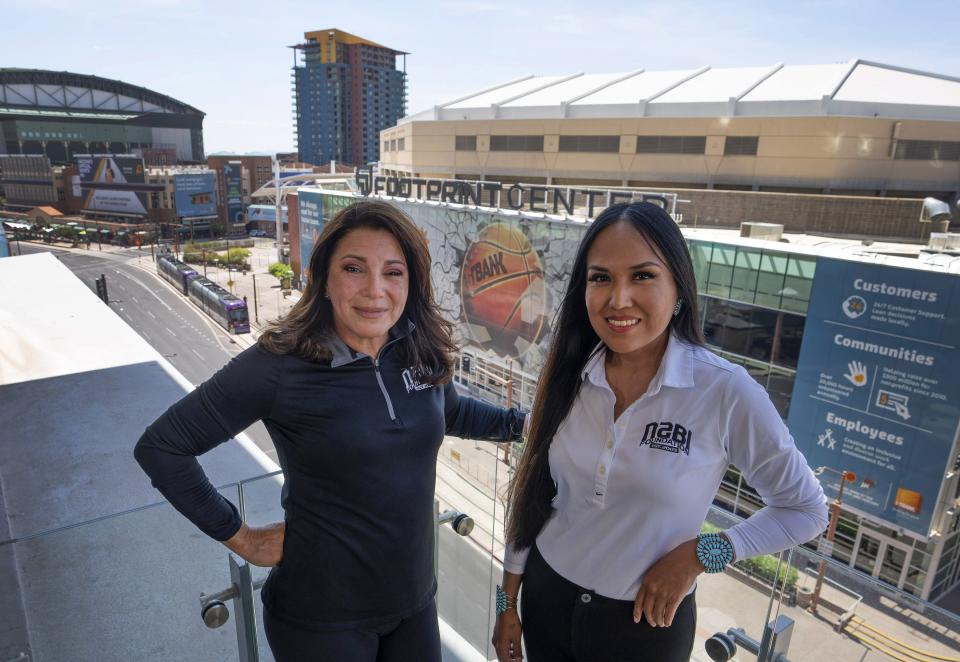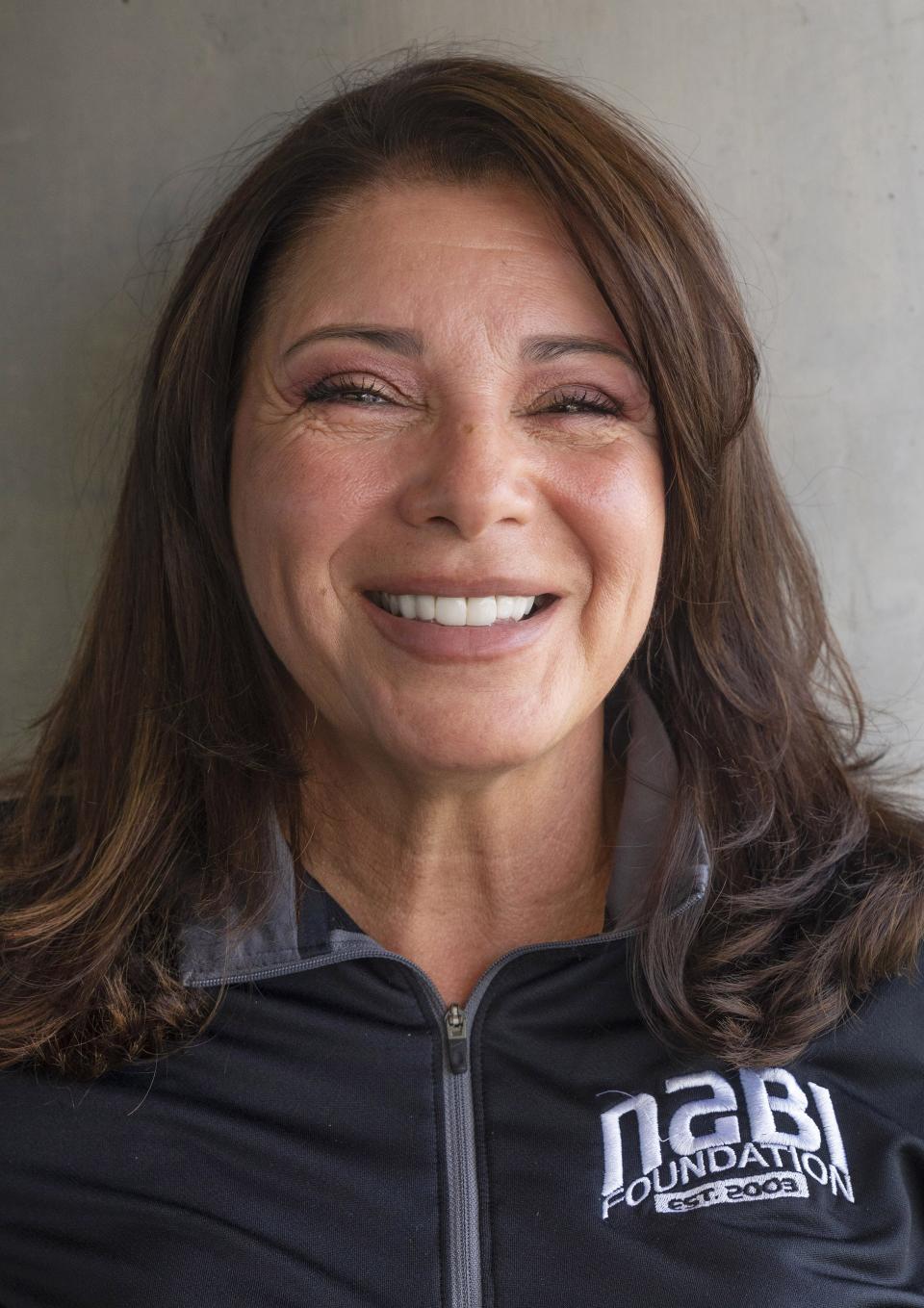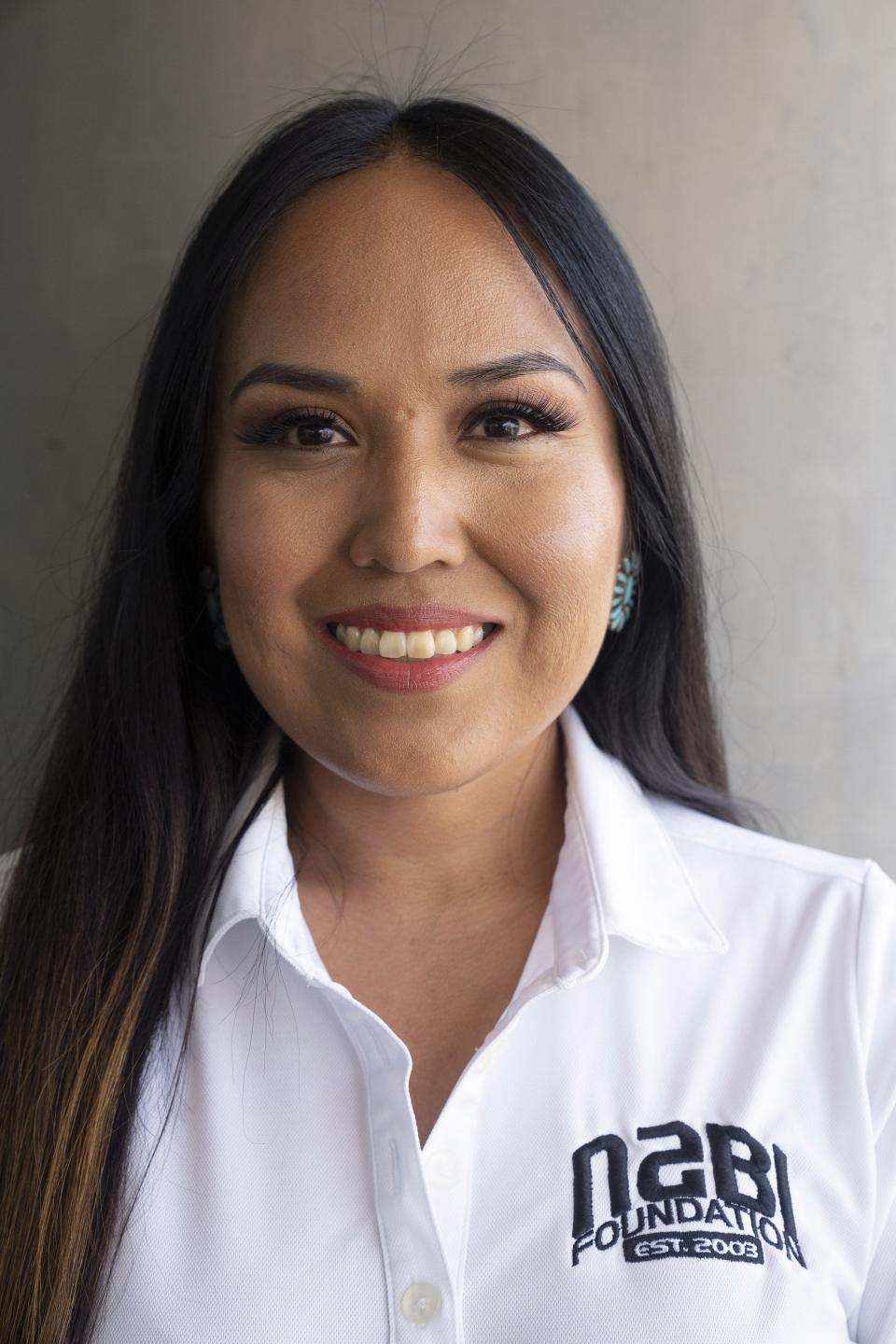How 2 women behind the largest Native American basketball tournament broke down barriers

As two women in the male-dominated sports industry, GinaMarie Scarpa and Lynette Lewis are used to being dismissed. But nothing holds them back from running the largest Native American basketball tournament in the country each year.
Scarpa, president and CEO, and Lewis, director of basketball operations, are the driving force behind the Native American Basketball Invitational held every year in the Valley. The invitational and education summit, founded in 2003, will have its 19th tournament July 17-23.
The girls and boys tournament championship games will be played July 23 at Footprint Center, home of the Suns and Mercury.
“The one thing with being a woman-ran organization is that you have to be strong,” Scarpa said. “And I say gritty because I love that word.”
Scarpa co-founded the invitational with Mark West, a former Phoenix Suns player. Scott Podleski, then working with the Arizona Rattlers, brought the idea of NABI to Scarpa’s attention while she was working as the executive director of the A.C. Green Foundation.
Because NABI’s mission statement differed from that of the foundation, it was declined by the latter's board — even though Scarpa heavily pushed for it to sponsor the tournament.

Scarpa felt drawn to NABI’s mission of educating Native American youth because of her work with the foundation. So, she stepped down from the A.C. Green Foundation to co-found NABI.
"(Green) would always make sure that we went out into our native communities here in Phoenix to get some of the kids to come to his programs,” Scarpa said. “He always made sure that was part of it. I have indigenous background with my mom, her people are indigenous Mexico border people of Texas. So, so for me, it was just something that sparked my experience, my passion, and I've been running it ever since.”
Scarpa didn’t know that she had Native American heritage when she founded NABI. She discovered that she is 24% Native American through an DNA test in 2015, and she said it only confirmed her belief that she was destined to run the invitational and help educate Native American youth.
But Scarpa said she still wasn’t taken seriously in her first years as CEO of NABI, and men working with her wouldn’t give the time of day to her ideas.
“There have been situations where I would have an idea, a great idea, I thought, and I would bring it to the attention of a man, and he would dismiss it,” Scarpa said. “But I got really smart in the beginning, and I started utilizing my male board members to bring the idea to their attention, that’s how bad it was.”
Through the years, Scarpa became more respected by her male peers and stopped going through board members to pitch her ideas.
Even though she knew she wasn’t taken seriously at first, she never felt out of place in the industry dominated by men. Scarpa said she grew up with seven brothers in Boston, so she was used to it. And that was something she had to teach Lewis, who was extremely shy.
Lewis started working with NABI as a volunteer while she was in college 11 years ago.
“I believe we sold shirts at one of the gyms at that time,” she said.
After her first experience as a volunteer, Lewis said she worked her way up the ladder, returning for an internship, temporary seasonal position, part-time job, and eventually becoming the director of basketball operations/program development and tournament director.

Lewis grew up in New Mexico just outside of the Navajo reservation. While her family had to move off the reservation for her to attend public school, she said she spent her entire summer on the Navajo reservation with her grandparents, witnessing firsthand how popular basketball is in Native American communities.
“It's a sport that anyone can play, all you need is a basketball and a hoop,” Lewis said. “When you go on the reservation, you would hardly see any, like concrete slabs or anything like that for basketball courts. So, you would see a lot of courts outside of homes with just nothing but the dirt ground and then, you know, they're sometimes they made their homemade hoops.”
Even though she doesn’t live near her hometown and the Navajo reservation anymore, she said she still feels like she’s giving back to her community in New Mexico. When she started working full-time with NABI, Lewis said she had to work through coaches and other vendors assuming that the tournament director is a man.
“When I started, I don't know if it's like a stereotype, but they just think there's a male in the organization,” Lewis said. “That a male is running this basketball tournament, because it’s sports.”
Although West co-founded the organization and is still involved in an advisory role, he stepped down from an active role with NABI in 2015 after two terms as a board member.
Scarpa hopes that women around the country, especially Native American girls attending NABI each year, can look up to her and Lewis.
“I think being a woman-ran organization though speaks volumes,” Scarpa said. “And a successful organization speaks volumes as what women are very capable of doing on any platform.”
Scarpa has a different upbringing than most Native American girls playing in NABI, but her goal is to inspire any young woman to get past difficult times in their lives. Scarpa said she grew up in a housing project in Boston and was a teen mom. She moved out to Arizona to start over.
“For me, it’s about how you pick yourself up,” Scarpa said. “You can make a mistake, and it might even have a major effect on your life, but it’s what you do after it … (at NABI) we do have some girls who are in situations where they feel they can’t reverse, and I’m here to tell them that they can do it.”
Scarpa and Lewis have become well-respected in the NABI industry, but there are still some setbacks because they are women in a male-dominated field. Scarpa said that the pair take a step forward to equality and respect in the sporting field, and then a few steps back.
Scarpa, who has been working in the nonprofit industry for over 30 years, is planning to retire from the NABI Foundation in the next five years, she said. But Scarpa said she has full trust in Lewis, and there couldn’t be a better person to take over her role as President and CEO — continuing the women-run tradition of NABI.
“I saw, from the moment I met her, that she had something,” Scarpa said. “... To be able to retire, and pass the torch to Lynette, is again another candle knowing, ‘I did it,’ and I’m leaving it in good hands.”
This article originally appeared on Arizona Republic: GinaMarie Scarpa, Lynette Lewis break down barriers with NABI event

